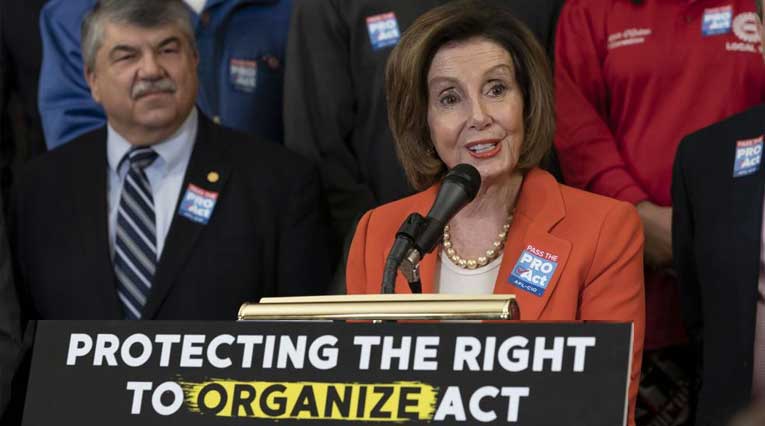If Enacted, The PRO Act Could Eliminate Most Forms Of Independent Contracting, Potentially Impacting As Many As 59 Million Freelance Workers.

Photo: Speaker of the House Nancy Pelosi, D-Calif., joined at left by AFL-CIO President Richard Trumka, speaks during a news conference about the Protecting the Right to Organize (PRO) Act at the Capitol in Washington, Wednesday, Feb. 5, 2020.
Photo Credit: J. Scott Applewhite / AP
Published February 15, 2021
The Center Square [Bethany Blankley] –
If enacted, the Democratic-sponsored PRO Act could eliminate most forms of independent contracting, gig work and freelancing – potentially impacting as many as 59 million freelance workers who represent 36 percent of the total U.S. workforce.
In 2020, the freelance community accounted for $1.2 trillion in earnings, according to a report published by UpWork.
UpWork found in a recent survey that freelancers were better able “to weather the COVID-19 storm,” than non-freelancers. More people became freelancers after having been laid off, the report notes, and found that working remotely and changing the way they worked enabled them to better earn a living and provide for their families.
The National Retail Federation describes the PRO Act – Protecting the Right to Organize – as “the worst bill in Congress,” which “features a laundry list of more than 30 radical labor provisions that, if enacted, would strip American workers of critical rights and flexible work opportunities while costing the retail industry billions of dollars.” The federation lists 10 reasons why the bill is bad for workers, including ending the ability for individuals to work independently and ending the gig economy.
The bill would eliminate the growing freelance industry, opponents argue, because it implements an ABC test similar to one enacted in California through its controversial AB5 bill, which became law in January 2020. The PRO Act would require workers to fulfill three criteria in order to keep their jobs. They first need to prove they have “absence of control,” meaning they are not under the direct control of their client. Second, they must show the work they perform is outside the course of a client’s usual business.
An IT worker or an accountant who contracts with a newspaper, American For Prosperity notes, would probably fail the absence of control requirement. A videographer who sells his or her own copyrighted work to a newspaper “would most certainly fail the business of the worker requirement,” AFP notes.
The third requirement relates to whether or not the contractor holds a professional license. An optometrist or barber would pass this part of the test, although they would probably fail the second test, AFP notes.
“What’s more, doing all or a majority of work for a single client at a given time can lead to a failure of this part of the test, regardless of whether this is a voluntary choice by an independent contractor,” AFP adds.
AFP warns that “all independent contractors should be wary of the potential to lose their independent status under this classification test. It is designed to reclassify most workers with flexible work arrangements and place them in traditional employment.”
“A sizable share of workers in the United States remain outside the traditional employment structure and consequently lack many of the protections and benefits that come with being a traditional employee,” the Brookings Institution reports. Proponents of the bill argue freelancers should be required to become full-time employees who receive benefits such as health insurance and paid vacation.
But the ABC test provisions of the PRO Act, AFP Senior Policy Analyst Austen Bannan argues, “would hurt both employers and employees by putting up numerous government roadblocks to the flexible work arrangements both are seeking. Instead of being able to work your own way as an independent contractor, the PRO Act could lead to both government and unions dictating the terms of your employment.”
“Independent contractors contract their services outside the direct control of [clients],” Erica Jedynak, director of economic opportunity at Stand Together, wrote. “[They] include gig economy workers, freelancers, many self-employed entrepreneurs, and workers in diverse professions – from yoga instructors to hair stylists to optometrists.”
Most of these workers would lose their jobs because they are not traditional fulltime employees or would be forced to unionize under the PRO Act. The outcome would mirror what happened in California after AB5 became law on a national scale, critics argue: massive layoffs and loss of work.
According to American Action Forum, employers would lose as much as $12.1 billion per year if the ABC test were implemented nationwide, and tens of millions of independent workers would lose their jobs.
“Any potential good that might be done by the PRO Act would easily be undone by the massive cost to the livelihoods of independent contractors and the businesses who need them,” AFP argues. The nonprofit organization is urging citizens to sign a petition to support independent contractors and to contact their legislators to oppose the bill.
National Right to Work Committee President Mark Mix told The Center Square that the PRO Act is “specifically designed to trample individual worker rights with the single goal of expanding the number of people forced to pay union dues or fees just to get or keep a job.”
He said, “The tens of millions of people who make a living or supplement their income as freelancers and independent contractors are among the legislation’s many targets for forced unionism.” The best thing these 59 million workers can do to protect themselves, Mix says, is to let their representatives in Washington, D.C., know that those who support the bill would be destroying their way of making a living.
If the PRO Act were to become law, Mix says, the NRWC expects a slew of litigation to be filed. The National Right to Work Legal Defense Foundation, the sister organization of NRWC, previously defended Uber and Lyft drivers who were targeted by a Seattle ordinance designed to force them into the Teamsters union. The case ended when the ordinance was found to have violated anti-trust law, but it represents an example of how independent contractors sued against forced unionism, NRWC notes.
In California, voters successfully challenged AB 5 by passing Proposition 22, which exempted rideshare company employees from the new law, including Uber and Lyft, allowing them to continue operating in the state. If voters hadn’t passed the initiative, the companies announced plans to leave the state.
After AB 5 was passed, multiple companies announced layoffs overnight, and within a year, California reported the first population decline in state history.






One Response
This is shameful – and I think along the Communist Party Lines.
We are a FREE nation – free to make out OWN decisions. We do not need you to interfere with this freedom.
Stop IT … now!!